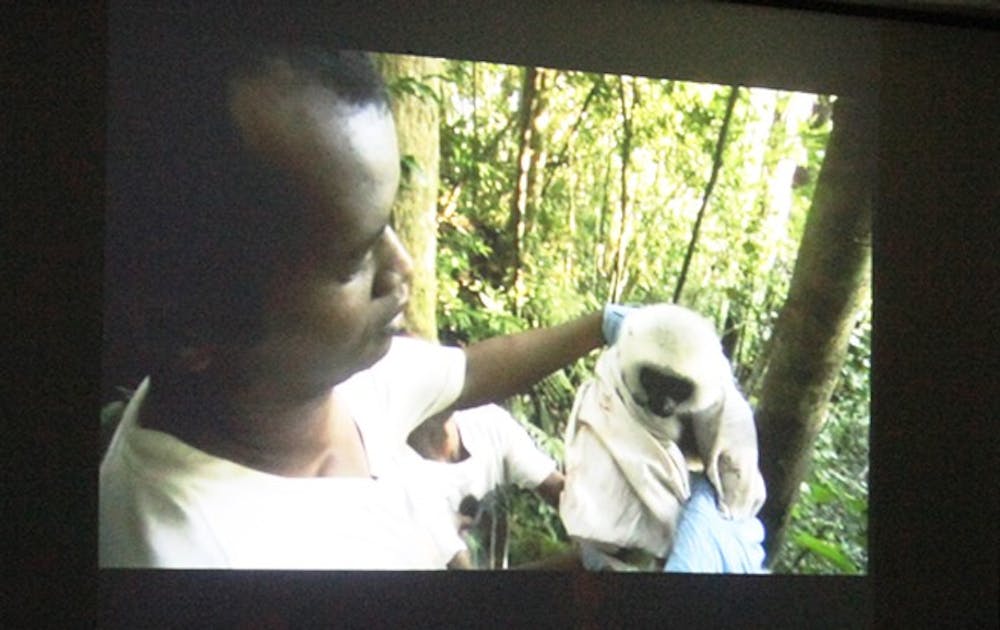A documentary set to air across the U.S. in December exposes the impact illegal rosewood logging has on critically endangered silky sifaka lemurs.
“Madagascar, Lemurs and Spies” features Erik Patel, a postdoctoral researcher at the Duke Lemur Center, and Sascha Von Bismarck, an investigator based in the Environmental Investigation Agency United States office, as they journey deep into Madagascar to preserve the rare lemurs’ habitats. The film, shown Monday night in the Physics Building, begins with a description of Patel’s efforts to understand silky sifakas in order to save a dying species. When he realizes the species’ preservation relies on cracking down on illegal rosewood and ebony logging, Patel reaches out to Von Bismarck for help.
“Rosewood is a dying species—it’s close to extinction and that’s mainly human driven and we don’t need it to do anything,” Patel said in an interview after the film. “It’s not essential to our existence, but those forests are essential to the existence of a lot of plants and animals.”
Patel has journeyed to Marojejy National Park—located in northeastern Madagascar—since 2000, living in a tent in the forest for ten months out of the year. Waking up every day at 4:30 a.m., Patel treks the region for the “ghosts of the forests” so that he can put radio collars on the few groups of lemurs he can find and collect samples of their feces. Doing so allows Patel to collect data on how many silky sifakas live in the forest and keep tabs on their health—the feces provides information on parasites in their systems.
Silky sifakas depend heavily on the conservation of Madagascar’s rainforests because their complex diets prevent them from being able to live in captivity or zoos. Female silky sifakas also only give birth to one baby every two years and are only fertile for one day each year, making a revitalization of the species incredibly difficult.
When Patel’s surveys of the species’ situation in Madagascar continuously showed that the biggest threat to lemur security was illegal logging, he trekked to the only internet cafe in the nearest town to share information about the practice. He noted that the threat of illegal logging was well-known, but there was a need for someone to take a real initiative and tackle the logging mafia.
“There are eyes everywhere,” he said. “We know exactly what’s happening even if we can’t stop all of it.”
The illegal logging of rosewood and ebony grew when a coup led by Andry Rajoelina overthrew former President Marc Ravalomanana in 2009. Patel said immediately following the coup, people rushed into national parks to cut down the precious woods. Some of this influx was orchestrated by the rosewood mafia.
“It was just an out of control free-for-all right after the coup, like nothing we’d ever seen before,” he said.
An article written by Von Bismarck about illegal logging inspired Patel to get in touch and ask for his assistance.
In 2008, a new amendment to the Lacey Act—a U.S. conservation law that criminalizes the destruction of plants and wildlife—banned the commerce of illegally sourced plants and their products. This meant that American companies could face heavy fines and incarceration for importing illegal timber for the first time. Von Bismarck said Patel presented an opportunity to put the Lacey Act to work, so he decided to go undercover and expose what Patel was witnessing on a daily basis.
To do so, Von Bismarck posed as a wood trader, which required the creation of a fake company, business cards and back stories. The preparation for his investigation took time, but Von Bismarck eventually found himself in a conversation with Roger Thunam, a major player in the ebony and rosewood export business.
“It turns out if you show up, they’ll just find you,” Von Bismarck said of the rosewood mafia.
After passing Thunam’s “test”—a series of questions that tested his story—Von Bismarck was led deep into the rainforest where he secretly videotaped his journey and collected the GPS location of tree stumps and trees Thunam’s men planned to cut down. Von Bismarck also saw the warehouse where the wood was stored and saw many of the pieces being cut to create guitars.
“If you’re buying wood from Madagascar, the answer is it is being cut in National Parks,” he said. “The question then is, ‘What did the guys who were actually exporting that stuff ask?”
Von Bismarck returned to Washington, D.C. to figure out where the wood exports were going. He found that a small percentage of these exports were going to an intermediary company in Germany, which sold them to Gibson Guitars, a company located in Nashville, Tenn.
With an arsenal of evidence, Gibson passed his findings over to federal officers, who quickly raided Gibson headquarters in August 2011.
“They came in with weapons, shut down our company [and] it cost us millions of dollars,” Gibson President David Berryman said in the film. “Madagascar is a pretty screwed up place.... I knew illegal logging was taking place and had an impact on wildlife and it should be stopped.”
Berryman then insisted that he did not know the wood was coming from Madagascar.
In an interview after the film’s screenings, Patel said Gibson eventually admitted they were guilty. The company had to pay $300,000 in fines.
“It’s a really important film because Gibson got fined, we got something out of all of this,” Patel said. “We got it to the public’s attention.”
The film will be screened on Animal Planet, Dec. 18 at 8 p.m.
Get The Chronicle straight to your inbox
Signup for our weekly newsletter. Cancel at any time.

